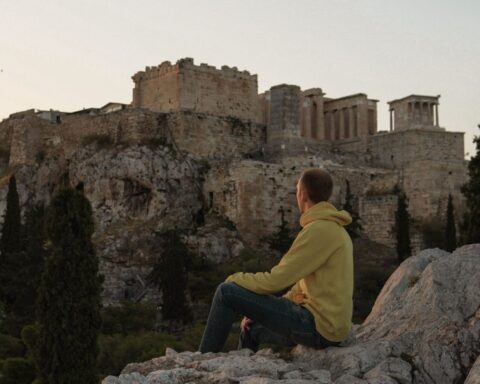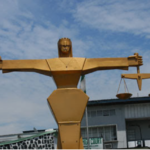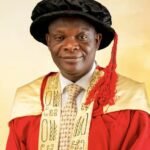Israel Adebayo Ogunyeade Adebajo was born on 21 January 1920 in the south-western town of Imobi in the fishing district of Epe in Lagos State, which had been the capital of the Ijebu Kingdom in the 18th century. He was born under British colonial rule: just six years after the amalgamation of Northern and Southern Nigeria by Lord Lugard. Israel died 50 years ago today in the Royal Free Hospital in London, aged just 49, leaving behind 14 children and four wives. The fact that Adebajo achieved so much in such a short life was credit to his innate entrepreneurial gifts and visionary sports management and marketing skills.
Israel’s grandfather, Jeremiah, was a missionary who had brought Christianity to Imobi. He thus grew up in a Christian home, imbibing values such as the Protestant work ethic and the dignity of labour. His father died when he was 14, forcing him to assume family responsibilities from an early age. Adebajo travelled to Lagos from Epe by boat in 1939 at the age of 19 on the eve of the Second World War, with the colonial government having not yet invested much in Nigeria’s road infrastructure. He attended St. Peter’s Church School in Faji (having earlier studied at Epe Grammar School) and undertook Secretarial Studies. He, however, never went to University, and was a self-made man.
*Israel at Work: A Pioneering Entrepreneur*
Israel became a typist with the Daily Times in 1942, banging away on an old typewriter in a dark room and also working as a vendor. To earn extra income, he used relatives to sell paper and stationary at bus-stops in Nigeria’s bustling capital of Lagos. While working for the newspaper, Israel noticed that the firm always needed stationary, and he set up a business to supply the paper. His first employees were his first wife, Olabisi, and his perennially loyal cousin, Christopher Adelaja, popularly known as “Brother Teacher,” in whom Israel had complete trust. As the business grew, Adebajo set up the Nigerian Office Stationary Supply (NOSS) Stores in 1944 in Willoughby Street on Lagos Island. The British colonial government had practiced a social apartheid since the 1920s, with Europeans only allowed to live in the segregated suburb of Ikoyi, interacting with Nigerians largely in the commercial hub of Lagos Island.
By 1950, Israel had built his first house in Rotimi Street in the Lagos district of Surulere, moving from Odufege Street on Lagos Island. He was able to rent out property in Rotimi Street to the British colonial army in a lucrative deal. By 1956, he travelled to England to meet with his suppliers – such as Rexel – and became the sole agent for important stationary products and office equipment such as paper, pens, and writing pads, establishing a monopoly over carbon paper. He also set up the Nigeria Paper Converters Limited as a manufacturing arm. His biggest inspiration and role model was John Dickinson, the British stationer who – having supplied paper to the East India Company at the height of the industrial revolution – set up a company in 1804 to manufacture paper from pulp in mills using a machine he had designed. Dickinson’s new methods would help transform the printing and publishing industry, making text and exercise books much cheaper to produce. Israel also wanted to emulate Dickinson by establishing a manufacturing company in Apapa’s Creek Road to make envelopes: a dream that remained unrealised at the time of his death in 1969.
The British colonial government was also a large customer of NOSS Stores, and British crown agents worked closely with the company, paying for goods in bulk. By the time Adebajo returned from England in 1956, he had acquired three houses. He also built a country home in the village of Naforija near the fishing town of Epe. His grandfather, Jeremiah, had led the building of St. Michael’s Church in Imobi, where he lies buried. His brother, Alfred, later managed the church, which Israel furnished. Israel himself was active in the St. Peter’s Church on Lagos Island (where he had gone to school), donating a marble baptistery in 1968.
Shortly after Nigeria’s independence in October 1960, Adebajo had the vision to build an office and factory in the Lagos district of Apapa which was then largely swamp land. His office on Warehouse road was the first building in the area, and the factory produced toilet roll and accounting books. Israel had also built residences in North Avenue and Kofo Abayomi Street in Apapa by 1964, also investing in property in nearby Calcutta Crescent. He owned five houses on Martins Street in Yaba, an area which had previously been inhabited by swamp dwellers. Adebajo was a workaholic who was in a hurry to conquer new empires, almost as if he knew he did not have much time to live. Some contemporaries likened him to the American automobile tycoon, Henry Ford, in his vision and innate entrepreneurial gifts.
By this time, he had also purchased two homes in London’s Brent Cross and Chiswick areas, and some of his children were attending private schools in England: his daughter, Adeola, was the first African student to attend Headington, followed by her sister Yanju, while sons Kunle, Leke, and Niyi went to Skipper’s Hill and Dover College. The religious Israel had expressed the hope that some of his children might one day study at Jesus College in Cambridge. Like many Nigerian fathers, he never really sat down with his children to talk to them about his life’s struggles and successes.
NOSS Stores – with branches across Nigeria – had paid-up capital in 1969 valued at over 100,000 British pounds. Adebajo was now able to assuage his passion for cars by buying Jaguars, a Pontiac, and a Cadillac. On his 40th birthday in January 1960, the high priest of highlife music, Victor Olaiya, entertained the invited guests at his home on Rotimi Street. Israel was also wealthy enough to embark on a world cruise in 1962 that took in Egypt, Australia, and America, sending his children post-cards along the way. His generosity was legendary, gifting houses to family and friends, and even supporting strangers seeking financial assistance. He was widely praised for his intelligence, warmth, and humility, consistently refusing to take a chieftaincy title and be addressed as “Chief.”
*Israel at Play: Super Stores*
Israel Adebajo had always been a sports fanatic, and was a member of the Island Club where he played tennis. He was also a founding member of Lagos’s Metropolitan Club. He visited the Racecourse on Lagos Island with his sons to watch horse-racing. He befriended a First Republic (1960-1966) parliamentarian, Alfred Osula, who had been a journalist at the Daily Times, and, from him, he bought land in the Lagos district of Agege with which he built a football stadium. Israel would establish his own football club in 1958, having bought Oluwole Philips Football Club which he transformed into Stationary Stores Football Club (SSFC). He then ploughed profits from the company into the new club. At this time, it was only large companies like Leventis, the United Africa Company (UAC), the Nigeria Railway Corporation, and the Electricity Corporation of Nigeria (ECN) that could afford to own football clubs in Nigeria. It was unprecedented for an individual to own a club, and have his name and company so closely associated with it as “The Adebajo Babes”.
Israel often came late to games at Onikan Stadium (former King George V Stadium) in Lagos – the then Mecca of Nigerian football – due to a hypertensive condition, and nervousness that his team might lose. Borrowing the logo of a Brazilian team of a flamingo, the players of Stationary Stores – nicknamed the “Flaming Flamingos” for igniting pitches with their exciting play – were decked out in a yellow jersey with maroon stripes, and the round logo of “SSFC” with a flamingo emblazoned in the middle of the stripe. They also wore yellow shorts with yellow handkerchiefs hanging round their necks. These colourful outfits added to the glamour and flamboyance of Stationary Stores in the city with the motto: “Eko for Show.” The team played an attractive brand of flowing, fluent, and attacking football that Lagosians quickly embraced. Stores’ main rivals in Lagos were ECN, Julius Berger, and Leventis, as the club started dominating the Lagos Challenge Cup.
Israel was determined to end Ghana’s dominance of West African football, and Stationary Stores was the first Nigerian team to play in the African Cup of Champion Clubs in 1968. Adebajo was a pioneering Pan-African, employing players from Ghana, Togo, Dahomey (now Benin), and other West African countries. Friendlies were organised with teams like Ghana’s Asante Kotoko. A decade before the Economic Community of West African States (ECOWAS) was born in 1975 through the vision of another prominent Nigerian – Adebayo Adedeji – Adebajo was already practising the free movement of labour across the sub-region. The man who washed the team’s jerseys – “Baba Wash and Press” – was himself a Togolese national.
Israel was also a competent, passionate, and generous sports administrator. His career as an administrator was impressive, transferring his solid management skills from his business to the arena of sports. He served on the board of the Lagos Football Association, and was Treasurer of the Nigerian Football Association (NFA) from 1958 until his death in 1969. The NFA oversaw the building of the National Stadium in Lagos’s Surulere district in 1961. Subsequent Nigerian sports administrators, however, allowed the stadium to fall into an embarrassing state of disrepair, and it closed in 2004.
Adebajo’s era of sports administrators seemed a far cry from today’s largely venal, incompetent, and corrupt crop of administrators running Nigerian sports. He generously imported the special jerseys used by the national football team – the then “Green Eagles” – during the 1968 Olympic qualifiers. In 1965, he had also created the Youth Sports Federation of Apapa (YSFA), consistently championing the cause of youth development.
The all-conquering Stores’ “Flaming Flamingos” that won two Challenge cups in a row in 1967 and 1968 had players that have since become legends of the Nigerian game: acrobatic goalkeepers Peter Fregene and Inua Lawal Rigogo – nicknamed the “Flying Cat” by Ghanaian president, Kwame Nkrumah – ; Tony “World 2” Igwe; Segun “Rock of Gibraltar” Olumodeji; Peter “Eusebio” Anieke; Sam Opone; Muyiwa “Lucky Boy” Oshode; Willie Andrews; Baba Alli; and Mohammed Lawal. Nine members of this team famously represented Nigeria at the 1968 Mexico Olympics, earning a creditable 3-3 draw against Brazil.
The support of Stationary Stores in Lagos was fanatical, and many have compared it to a cult, and even a religion. As the most well-supported team in the ethnically cosmopolitan city of Lagos, Stores also sought to unite diverse ethnic and class groups for a common cause in the nation’s then capital, particularly during its own halcyon days, as the Nigerian civil raged between 1967 and 1970.
*Israel’s Last Days: So Much To Do, So Little Time*
Israel’s death in July 1969 was a shock to his family, friends, and fans. He fell ill on Palm Sunday in April 1969 when he started vomiting He became increasingly fatigued, his abdomen swelled up, and he was eventually diagnosed as suffering from cirrhosis of the liver; diabetes; gastro-intestinal bleeding; and hepatic failure. A team of doctors – led by Ekpo Eyo and Aderonmi Laja – attended to him. He started working increasingly from home, dictating letters to his private secretary, and going occasionally to the office. As he observed his health deteriorating, Israel – renowned for his meticulousness – went to his lawyer, Adeyanju Osijo, by the end of May 1969 to ask him to start preparing a will.
He signed the will in his NOSS Stores office – witnessed by two staff members – on 25 June: exactly a month before his death. He asked that the date of the will be back-dated to his birthday on 21 January, as this would be his birthday gift to his wives and children. The lawyer kept a copy of the will, and deposited copies with Standard and Barclays banks on the instruction of the testator. On 24 June, one of the sick man’s wife, Irene, organised a Sara (thanksgiving prayer meal) attended by Israel’s brother Luke, and some office staff.
Two days later, he visited his wife, Adunni, to consult on naming his last-born child Adefemi Mofolorunso, born just four days earlier. Advised to seek more specialised treatment abroad, he left Nigeria on 28 June 1969, never to return alive. On the same day as his departure for London, he went personally to Standard Bank in Apapa to procure traveller’s cheques for his trip before leaving. He was admitted to hospital on arrival for about three weeks, discharged, and re-admitted. He stayed part of the time with his sister Florence Odunsi, who visited him in hospital every day. Sheila Sherlock – an expert in liver diseases – was the doctor in charge of his care at London’s Royal Free Hospital. She reported that Israel had gone into liver failure and died on the morning of 25 July, having suffered a massive gastro-intestinal haemorrhage.
Adebajo’s funeral was a huge affair, with footballers of Stationary Stores juggling the ball along the route as part of the large cortège accompanying the hearse to the burial site in his country home in Naforija. Musicians composed elegies, with the most famous being juju superstar, Sunny Ade, and his Green Spot Band’s song “Late Israel Adebajo.” Israel was buried near his parents’ graves. A striking large, marble white statue in his image – clad in traditional flowing robes with his signature upright, tall cap and long chain hanging around his neck – was erected above the grave on the first anniversary of his death in July 1970.
*Israel’s Legacy: Life Without The Founder*
As earlier noted, Israel Adebajo was a polygamist, who had four wives and 14 children. As is typical in such cases once the patriarch departs, the feuding soon begins, as the glue that had kept the family together comes unstuck. A 1971 landmark court case pitched two legal giants against each other in a Clash of the judicial Titans: Kehinde Sofola was Counsel for the defence, while Rotimi Williams was Counsel for the prosecution. Legendary Oxford-trained, Chief Justice of Lagos State, J.I.C. (John Idowu Conrad) Taylor added to the drama, delivering a magisterial judgment that has since been studied in legal classrooms across Nigeria. The crux of the case revolved around one of Israel Adebajo’s wives, Irene’s legal team arguing that her husband was not of sound mind when he made his will. They, therefore requested that the document be declared null and void, arguing that Israel Adebajo had died intestate. Judge Taylor, however, in his final judgment, declared that the document was “the last will of a free and capable testator.” The case went all the way to the Supreme Court, before being dismissed by Chief Justice, Taslim Elias.
Israel Adebajo’s legacy is remarkable, as a pre-independence entrepreneur and founder of the first privately-owned football club in Nigeria. Even at the global level, his achievements were impressive. Though the Fiat-owning Agnelli family bought Juventus Football Club in 1923, television mogul, Silvio Berlusconi took over AC Milan only in 1986. In the Nigerian context, it was only in the 1980s that business tycoons, Emmanuel Iwuanyanwu and Moshood Abiola, established their own football clubs.
But, both the company and the club fell on hard times following the death of their Founder. Many members of Stores’ double Challenge Cup-winning team left the club, as funding and bonuses dried up, and management became less efficient. The club though still produced players like Yomi Peters (who described how Israel Adebajo had gone to meet his mother on the eve of his death to convince her to let her son join Stores); Haruna “Master Dribbler” Ilerika; Yakubu Mambo; Sanni Mohammed; Peter Rufai; Ike Shorounmu; Wakilu Oyenuga; Asudu Ibrahim; Taiwo Affinih; Daniel Ajibode; and Julius Akpele. Shooting Stars of Ibadan midfield maestro, Mudashiru Lawal, also joined Stores in the twilight of his career. The team continued to have the most fanatical supporters in Nigerian football, and won the Lagos State Challenge Cup in 1974 and 1976; the national FA Cup in 1982 and 1990; the Premier League in 1992; and narrowly lost to Cameroon’s Union Douala 2-1 in the two-legged final of the African Cup Winners’ Cup in 1981. The common refrain from the stands was: “Up Stores”; “Up Super”; “Triple Flaming”; and “Gbogbo wa l’ore Adebajo! Iyo!” (“Let us not out of malice, spoil a good thing since we are all friends of Israel Adebajo.”)
But Super Stores – widely known as “the darling club of Lagos” – would suffer many trials and tribulations, as other teams like Rangers, Shooting Stars, Bendel Insurance, Mighty Jets, Abiola Babes, Leventis, and Iwuanyanwu Internationale came to the fore. A bribery scandal in 1985 led to the exit of several players, accused of having taken money to throw a match. Stores was relegated from the Nigerian first division in 1993, a year after winning the league. Salaries and sign-on fees were irregularly paid. By this time, its supporters consisted of businessmen, journalists, civil servants, politicians, professionals, taxi-drivers, touts, and “area boys.” The club developed a fearsome reputation, and from the 1980s, was seen, in some quarters, as being full of hooligan elements prepared to intimidate rival fans, as well as bully opposition players and referees. This image was reinforced by an incident in Ibadan during a Challenge Cup match against Rangers in September 1995, when Stores supporters invaded the pitch in the 87th minute after a controversial penalty was scored by Rangers. In the ensuing melee, the younger brother of Super Eagles legend Finidi George – Igeniwari – was shot in the team bus by what the Nigerian police often refer to as “a stray bullet” following the “accidental discharge” of a weapon. He later died of his wounds. Stores were there after banned for three years from playing in the Nigerian league.
At the end of the ban in 1998, the “Flaming Flamingoes” were suspended from the second division following a legal dispute over the ownership of the club. Stores’ players, by this time, were playing without formal contracts, bonuses often went unpaid, and even some of their kit was not provided by the management. The club returned to the league in 2004, only to be relegated in the same season. In one game against Nitel United, Stores notoriously only arrived with 11 players, and did not have a single substitute on the bench! Its fanatical Supporters Clubs – with 52 Nigerian chapters and 10 overseas branches by 2016 – mobilised funds and ensured that Stores returned to the league in 2014. The following season, the club did not play in the league in order to enable a restructuring of the team, before returning in 2017. Throughout these difficult times, fans remained loyal to the club, raising money to pay players’ salaries, transfer fees, travelling with them across the country and the continent, and even supervising the training of the team and player conduct. A particularly important financier in the early 1990s was Sola Idowu, popularly known as “Mr. Anonymous.”
The demise of the football club was mirrored in the demise of the company. After the death of its Founder, the Nigerian Office Stationary Supply Stores became a shadow of its former self, barely functioning with a skeletal staff, as other companies like Onward Paper Mill took over the space occupied by Israel’s previous dominance of the sector. NOSS Stores recovered somewhat in the 1970s but continued – like the football club – to limp from crisis to crisis, as successive post-1985 military governments in Nigeria devalued the naira, making it increasingly difficult for companies like NOSS to import parts and equipment from abroad.
Israel Adebajo’s estate that should have been wound down in 1992 remains an area of contestation among family members. It was reported in May 2019 that two of his children – Adeola and Adetilewa – were removed as executors of Israel’s will through a judgment of the Lagos High Court by Justice M.O. Obadina. This followed a complaint brought by one of Israel’s wives , Irene, and three children – Gloria, Adeleke and Margaret – over non-remittance of proceeds from the estate for 14 years. Fifty years after his death, the family patriarch’s soul has not been allowed to rest in peace, as family squabbles have continued.
Israel Adebajo was an enterprising, dedicated, and visionary pioneer who worked hard and played hard. He has left an enduring legacy on Nigerian commerce and football. Israel, however, was full of paradoxes: he was from a poor background, but became a prosperous businessman; he had limited education, but used an acute intelligence to create a business conglomerate; he was simultaneously a polygamist and a pious man; and he was both an earnest entrepreneur and an extravagant entertainer. On this fiftieth anniversary and golden jubilee of Israel’s passing, it is fitting to remember the life and times of the original “Flaming Flamingo” who left an indelible mark on the footprints of time. I was two when he died. He was my father.
Professor Adekeye Adebajo is Director of the Institute for Pan-African Thought and Conversation at the University of Johannesburg in South Africa
Follow us on all social media platforms @dailyquery



























